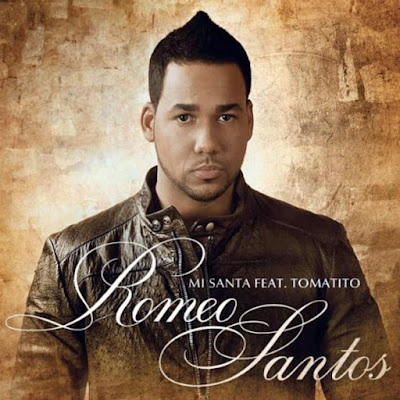3rd March, 2012
Romeo's solo conquest of the Hot Latin chart, and his (temporary) expansion of the language of bachata to a broader pop metier, continue apace. "Mi Santa" was, once more, only #1 for a week, but its lush romanticism, hard on the heels of Daddy Yankee's hyper socatón, Víctor Manuelle's genial salsa, Paulina Rubio's cooing dance-pop, and Gloria Estefan's brash electroswing, point to a chart moment that could be considered either vibrantly, capaciously pluralistic or bored, easily distracted and indecisive, depending on how you wanted to characterize it. I am always on the side of musical diversity, so Romeo inviting a flamenco master to share the spotlight in the same way he had R&B mogul Usher works for me: what a purist might see as a cynical appeal to exogenous markets I prefer to see as a big-tent approach to music-making in which nothing is off the table as long as it works.
And it does work: Romeo, at least in this first album, is a master of synthesis, and his bachata harmonizes as well with Tomatito's fluid fingerpicking dramatics as it had with Usher's fluid vocal dramatics. José Fernández Torres, the third member of an Andalusian Roma musical dynasty to be called by some variation of the "El Tomate" nickname (his son is the fourth), first came to fame backing the brilliant and eccentric cantaor Camarón de la Isla in the 1970s; filling the shoes of the equally brilliant and eccentric Paco de Lucía was no easy feat, but Tomatito's jazz and Afro-Cuban influences did just as much to expand the palette of modern flamenco towards the end of the 20th century. His playing here hardly brings that whole history to bear, of course: some basic runs underneath Romeo's verses, and a passionate, harmonics-leaping solo between choruses are about the limit that a contemporary pop-bachata song can take, and he provides it.
It's Romeo's lyrics that give this song its most potent frisson: "My Saint" is a simple translation of the title, but the cultural connotations would require a whole graduate seminar on Latin Catholic thought. Its deeply considered heresy, referring constantly to the lover as an object of religious veneration and his own devotion to her as a specifically Catholic practice, is in line with the conventions of nineteenth-century French (and Spanish and Italian, etc.) Romanticism, and even, in inverse, with older traditions like Teresa of Ávila; by contrast, the earthy, sensual, and deeply human guitar of Tomatito prevents it all from sounding too saccharine or even ascetic.
The video for "Mi Santa," released in January of 2012, mashed two songs from Formula, Vol. 1 together, so for younger listeners "Mi Santa" is perhaps nowadays thought of as the second half of "La Diabla." But I'll have to wait to discuss that; Romeo isn't done with his album cycle.

